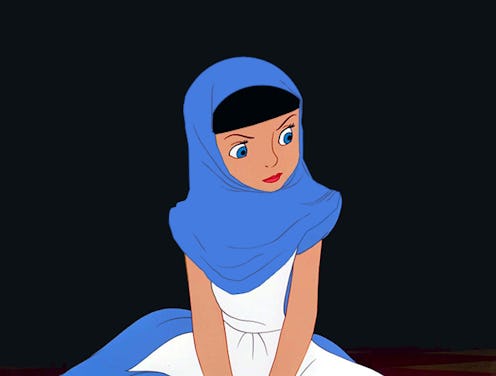Entertainment
Pure Racism or a Chance for Cultural Exchange?

According to Time, Buzzfeed, The Guardian, and countless voices on Twitter, ABC's upcoming show, Alice in Arabia, may be a poorly planned venture into demonizing Saudi Arabia and Islam and perpetuating stereotypes about the region and its people. I, for one, cannot wait to watch it. Simply based on the amount of backlash from both sides of the Atlantic (or Pacific), it seems to me that the show, while it hasn't even aired yet, has already facilitated the creation of a cross-cultural discourse based on mutual dissent.
The show will focus on the experiences of Alice, "an American teenage girl kidnapped by her extended royal Saudi Arabian family and forced to live with them." The premise alone brings to mind Borat approaching Pamela Anderson with a bag. It's no surprise, then, that many people have spoken out against the show propagating the stereotype that Muslim women only wear veils because they are oppressed, or the idea that Saudi Arabia is comparable to Wonderland (with its hookah-smoking caterpillars and disappearing cats).
#AliceinArabia on Twitter is lighting up with references to the Buzzfeed article summarizing the pilot script. Much is made of the fact that the author, Brooke Eikmeier, formerly served in the United States military, and the fact that an ABC Family spokesperson, who would only comment on the condition of anonymity, called it “irresponsible” to “pre-judge” a show that hadn’t yet been produced.
I disagree that it is "irresponsible" to "pre-judge" a show before it has been produced. I'd argue that pre-judging a show is fine, as long as you follow up with your critique by actually watching that show. In fact, this may be the show's most redeeming quality: it has drawn the interest and voices of numerous individuals who actually are Muslim or live in Saudi Arabia. This allows the American audience a chance to strike up a conversation with the population "Alice" purports to represent.
One Twitter user has even responded with his vision of a satirical alternative show, "Ahmed in America."
So, where can we go from here? If Alice in Arabia actually makes it through this media firestorm, we can analyze the living daylights out of each episode. We can take to Twitter by the thousands, to read the opinions of viewers from Saudi Arabia or London or America. We can use our collective voice on social media to dive for moments of truth, such as the story of Nazia Quazi, whose father stole her passport to keep her from leaving the country. We can also harshly condemn moments that simplify or misrepresent a complex culture. Just as America cannot be reduced to vegan cookies and alternative rock, Saudi Arabia cannot be reduced to a desert inhabited by veiled women and oppressive men.
In a way, ABC is like a child who is trying to make a new friend for the first time. In this case, they have drawn a rather clumsy picture of that friend's home. The grass is taller than the house, the windows are unrealistically blacked out, and there is enough smoke coming out of the chimney to indicate a vigorous grease fire in the kitchen. In short, this is a grasping attempt to humanize and contextualize Saudi Arabia for an ignorant population of Americans. As misshapen, offensive and potentially inaccurate as this depiction may be, we can't afford to lose sight of the opportunity that it presents. The Twitter response alone has shown that there are passionate people on the other side of this dialogue. Most of them are justifiably offended, and some of them have biting senses of humor.
All of them have a voice, a perspective, and a life story, and this is a chance to meet theirs with our own.
Image: ABC